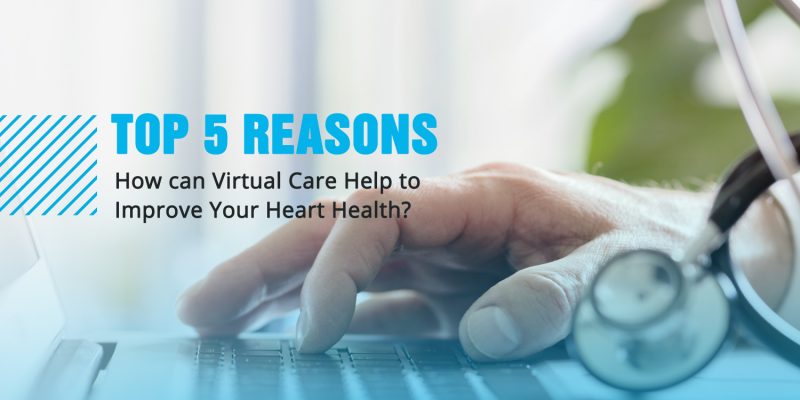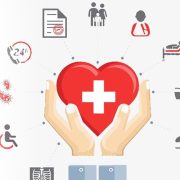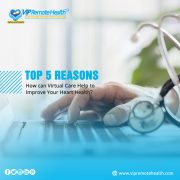Heart disease is one of the most common health conditions among adults across the globe. More than one-third of Americans have at least one of the heart conditions and battling heart disease can be quite a challenge. Missing a single doctor’s appointment can cause serious harm, but visiting can also seem like a challenge for some people.
It is for this reason that many doctors have started providing virtual care programs as an alternative or in addition to in-clinic visits. Certified healthcare professionals use a remote patient monitoring system to keep a check on patients and monitor heart health. It is a virtual care system that is delivered over a distance using electronic and telecommunication technologies.
What is Virtual Care?
Virtual care makes use of various processes such as text messaging, phone calls, and interactive platforms. These processes transmit data regarding your health to your healthcare provider and also help you receive personalized appointment reminders while also setting health and wellness goals.
The virtual care programs use remote patient monitoring software to record health-related data such as blood pressure and send it to healthcare providers. Such software also includes Care Management such as Principal Care Management, and Chronic Care Management, and connects the patient to a care team.
The care team assists you in managing your heart health with regular periodic phone calls and tailor-made care plans. Various heart conditions such as heart failure, high blood pressure, and cardiovascular disease can be effectively managed by a virtual care program.
Reasons to choose virtual care
- Brings change in your lifestyle
People who enroll in a virtual care process are met with regular outreaches from a care team. The team encourages you to take proper care and helps you adjust your lifestyle. The team will work with you to create a personalized care plan and guide you based on your healthcare provider’s recommendations. The team might also monitor your health data and address health concerns.
Upon committing to such a treatment plan, you will need to make lifestyle changes. The changes will include getting physically active, monitoring your blood pressure, eating less processed foods, avoiding tobacco smoking, and maintaining a healthy weight.
The care team will evaluate your health conditions and recommend practical ways to reach the desired goal. They will ensure that you steadily change your habits and stick to the new habits with their support and motivation.
- Accessible healthcare, when you need it
In-person care can be quite difficult to get due to weather conditions, illnesses, or transportation issues, especially during the pandemic. Virtual care programs are becoming increasingly prevalent because of their ability to make healthcare services accessible to everyone.
The remote patient monitoring system enables people to connect with their healthcare provider from the convenience of their homes and receive cardiology care and recommendations. It is made possible with the assistance of your care team. The team collaborates with your doctor to ensure you are receiving the right medication for your heart condition.
Virtual healthcare is not meant to replace in-clinic appointments since they are still very beneficial. Physical checkups are crucial from time to time. However, the ease of accessibility of virtual care allows patients to discuss matters with their care team and also know when to get evaluated in person.
- Early detection of heart conditions
Virtual care processes such as remote patient monitoring software and Care Management also enable your doctor to detect any health concerns at their initial stage. Since patients visit their doctors for checkups only a few times a year, the time in between could be enough for a certain heart condition to go unnoticed.
The virtual care system helps patients and doctors stay updated by staying connected with the healthcare team. The virtual care and its consistent touchpoints ensure that health-related concerns or complications are spotted early on and treated effectively.
The virtual care system uses remote patient monitoring software and devices such as blood pressure cuffs and pulse oximeters to keep a check on heart health between in-clinic visits and report health data to the healthcare team and provider in real-time.
So, if the health data shows that you are experiencing high blood pressure, the care team will immediately report it to your provider, who in return will prescribe a change in medication.
- Stay involved in matters of your health
The virtual care system involves the patient in matters of health decisions. You may enroll in a Care Management program or a remote patient monitoring system. Either way, you will gain personalized health and wellness information that will assist in your health journey with a consistent outreach.
The care management system will help you design a care plan that meets your needs and goals. The plan will include lifestyle changes, ways to control blood pressure, overall health monitoring, and scheduling of in-clinic appointments. You can discuss and make changes to your health plan simply by making a phone call.
Within the remote patient monitoring system, the data reported by your devices will guide the coaching calls from your care team. It will ensure you are on track with your health goals. Self-monitoring your health data on a daily basis will help you stay consistent with your health progress, even when you do not interact with your care team.
Enhanced quality of life
The biggest advantage of enrolling in a virtual care program with remote patient monitoring software is a better quality of life.
The consistent monitoring and communication from the program eventually lead to lower healthcare costs which are otherwise incurred due to emergency hospital visits and finding better–priced medication.
The virtual care system helps you eliminate the stress that results from having to call and coordinate with multiple healthcare providers. The process provides you with a list of free local resources, and social services based on your needs and availability.
Studies have shown that the benefits of virtual care have led to improved heart health. Patients have experienced reduced rates of emergency clinic or hospital visits due to heart failure, a 50% reduction in risk of heart attack, and lowered blood pressure.
So, enroll in a virtual care program and let your care team manage your health while you get to do what you love!
Also Read:























Comments